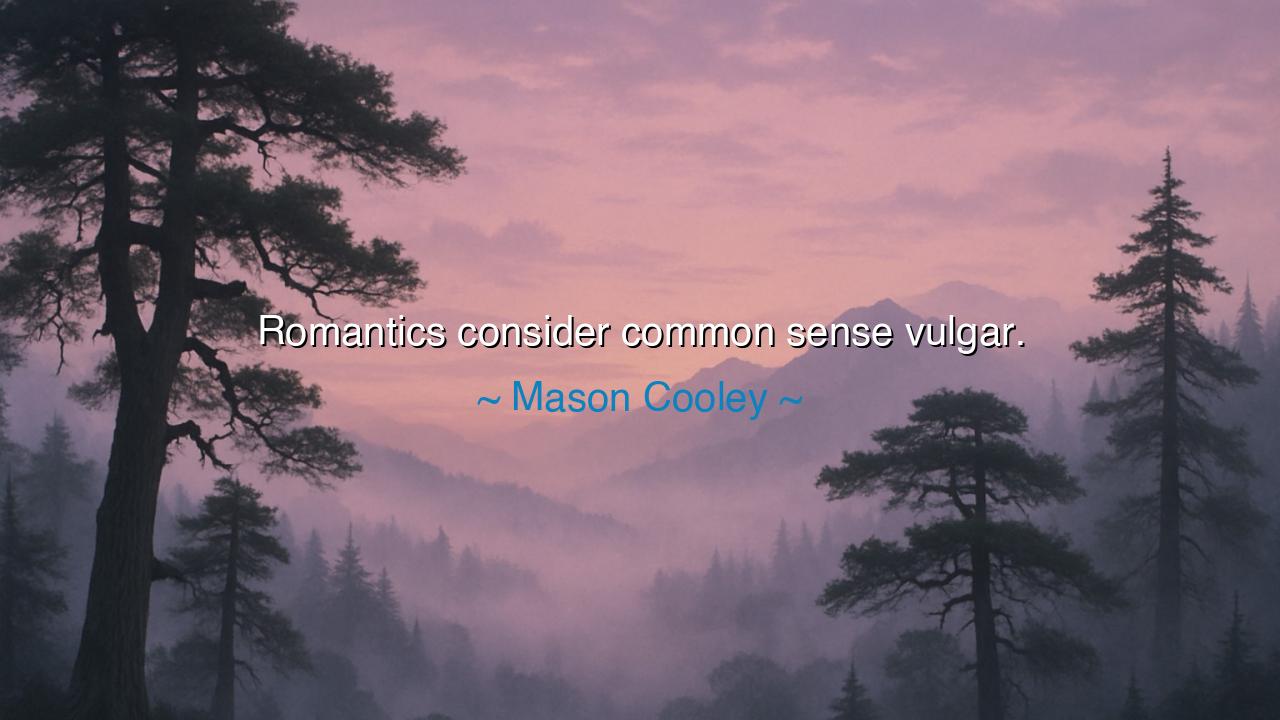
Romantics consider common sense vulgar.






"Romantics consider common sense vulgar." – Mason Cooley. A profound assertion, rich in wisdom, pointing to a tension between two ways of understanding the world. In this brief yet striking phrase, Cooley unveils a division that stretches back through the corridors of time. On one side stands the rigid practicality of common sense, and on the other, the lofty, untamed dreams of the romantic spirit.
The ancient philosophers, such as Plato and Aristotle, viewed the balance of reason and passion as the fulcrum upon which the human soul tips. Common sense—logical, practical, grounded in the here and now—was seen as the safeguard against folly. Yet, the romantic spirit, which was born from the same roots as the philosopher's search for truth, cast a critical eye upon such mundane truths. For the romantic, love, passion, and the pursuit of a higher calling beyond the physical world were the true expressions of a soul seeking the divine.
Indeed, romantics disdain what they perceive as the "vulgar" because it remains tethered to the ordinary, the routine, and the predictable. The heart of the romantic seeks liberation—liberation from the mundane, from the weight of everyday concern. As they gaze upon the world, they see it not as it is but as it could be, a canvas of infinite possibility. In their eyes, the practical application of common sense stands in the way of grand dreams and ideals, which are the very essence of their being. They believe that greatness is not to be found in the commonplace, but in the uncharted and the unexplored.
Consider, for example, the great poets of the Romantic era, such as Lord Byron, Percy Bysshe Shelley, and John Keats. Their works were a rejection of the suffocating logic of the Industrial Revolution and the rise of utilitarian thought. Instead, they celebrated emotion, nature, and a spirit of defiance against the status quo. They saw in nature not a mechanical system to be dissected but a living, breathing expression of the divine, and in their personal lives, they often pursued love and passion with reckless abandon. To them, love was not a transaction governed by reason, but an all-consuming force that could transcend the trivialities of the everyday.
This attitude is not limited to poets alone. In history, we find countless figures whose lives embodied the romantic ethos—Napoleon Bonaparte, for example, was not driven by the mundane rules of statecraft, but by a grand vision of empire and glory. His ambition was not bound by the common sense of his time, and for that, he was hailed as both a hero and a tragic figure. His downfall, however, serves as a cautionary tale: the pursuit of idealism without the grounding of reason can lead to ruin. Even Leonardo da Vinci, though a man of profound intellect, sought to unify art and science not merely through logic but through an inspired vision that merged the realms of the sensible and the divine.
There is wisdom in Cooley’s words. For the romantic soul, common sense is the anchor that tethers the spirit to the earth. It prevents the soaring of the soul into the heavens and pulls it back down to face the harshness of reality. However, without the tension between these two forces—the romantic ideal and the practical common sense—the world would stagnate. For if we only sought to fulfill the pragmatic demands of life, we would miss the very heights of human potential.
Thus, the lesson is not to dismiss common sense but to understand its limitations. Let the romantic dream and the visionary idea guide us to new heights, but let the practicality of common sense anchor us in a reality where we can act and build. In our own lives, we must seek the balance between these two forces. The dreamer must not forget the ground beneath his feet, and the pragmatist must not ignore the stars above. To live solely by the laws of the earth is to miss the beauty of the heavens.
In this way, we are called to live with both passion and reason, to allow the spirit to soar while keeping one’s feet firmly planted in the world of the living. So let us strive to find the balance, to chase our dreams with full heart and mind, but not at the cost of the simple, enduring truths that guide our every step. May we embrace the duality within ourselves, forever torn between the celestial and the earthly, and in doing so, find the true richness of life.






AAdministratorAdministrator
Welcome, honored guests. Please leave a comment, we will respond soon